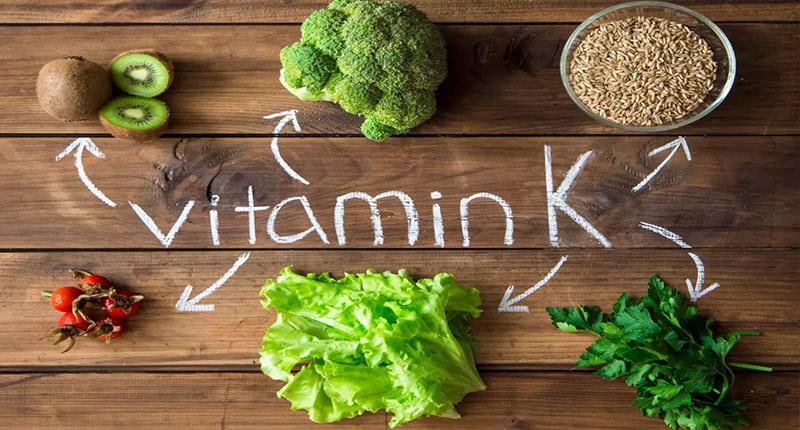
Vitamin K is an essential nutrient that plays a crucial role in various bodily functions. It is often overlooked compared to other vitamins, but its benefits are significant. In this article, we will explore the incredible benefits of vitamin K, its types, food sources, deficiency symptoms, recommended daily intake, and safety considerations.
What is Vitamin K?
Vitamin K is a fat-soluble vitamin that is necessary for blood clotting and maintaining bone health. It exists in two primary forms: vitamin K1 (phylloquinone) and vitamin K2 (menaquinone). While vitamin K1 is mainly found in leafy green vegetables, vitamin K2 is synthesized by bacteria in the gut and is also present in fermented foods.
Types of Vitamin K
Vitamin K can be classified into two main types: vitamin K1 and vitamin K2. Vitamin K1 is commonly found in plant-based sources, such as spinach, kale, broccoli, and Brussels sprouts. On the other hand, vitamin K2 is produced by bacteria in the gut and can also be obtained from animal-based sources like egg yolks, cheese, and butter.
Functions of Vitamin K
The primary function of vitamin K is to facilitate blood clotting. It plays a vital role in the production of several proteins that are involved in the coagulation process. Additionally, vitamin K is essential for maintaining strong and healthy bones by assisting in the regulation of calcium deposition.
Health Benefits of Vitamin K
- Promotes Blood Clotting: Vitamin K is crucial for proper blood clotting. It helps activate clotting factors and ensures that wounds are healed efficiently.
- Supports Bone Health: Vitamin K works in synergy with other nutrients, such as calcium and vitamin D, to promote bone health. It helps improve bone density and reduces the risk of fractures and osteoporosis.
- Reduces the Risk of Heart Disease: Research suggests that adequate vitamin K intake may lower the risk of heart disease. It helps prevent the buildup of calcium in the arteries, which can lead to arterial stiffness and cardiovascular problems.
- Improves Cognitive Function: Some studies indicate that vitamin K may have a positive impact on cognitive function and brain health. It is believed to help protect against age-related cognitive decline and neurodegenerative diseases.
- Enhances Skin Health: Vitamin K has been found to have beneficial effects on the skin. It helps reduce the appearance of dark circles, bruises, and spider veins. Additionally, it may aid in wound healing and minimize scarring.
Food Sources of Vitamin K
Vitamin K can be obtained from a variety of food sources. Good plant-based sources of vitamin K1 include spinach, kale, broccoli, Brussels sprouts, and parsley. Animal-based sources of vitamin K2 include egg yolks, cheese, butter, and fermented foods like natto and sauerkraut.
Vitamin K Deficiency
A deficiency in vitamin K can lead to various health problems. Symptoms of vitamin K deficiency may include easy bruising, excessive bleeding, bleeding gums, and prolonged clotting time. Individuals with conditions that affect fat absorption, such as Crohn’s disease or cystic fibrosis, may be at a higher risk of vitamin K deficiency.
Recommended Daily Intake of Vitamin K
The recommended daily intake of vitamin K varies depending on age and gender. For adults, the adequate intake (AI) is set at 90 to 120 micrograms per day. It’s important to note that vitamin K deficiency is rare in healthy individuals who consume a balanced diet.
Safety and Side Effects
Vitamin K is generally considered safe when consumed in recommended amounts. However, high doses of vitamin K supplements may interfere with certain medications, such as blood thinners. It is always advisable to consult with a healthcare professional before starting any new supplements, especially if you are taking medications.
Conclusion
Vitamin K is a vital nutrient with numerous benefits for overall health. From supporting blood clotting to maintaining bone density and promoting heart health, its impact on the body is significant. Including vitamin K-rich foods in your diet or considering supplementation can help ensure you meet your daily requirements and enjoy the incredible benefits of this essential vitamin.
FAQs
- Can vitamin K supplements replace a healthy diet? No, while vitamin K supplements can be beneficial for individuals with deficiencies, they should not replace a balanced diet. It’s best to obtain nutrients from a variety of natural food sources.
- Are there any interactions between vitamin K and medications? Yes, vitamin K can interact with certain medications, such as blood thinners. If you are taking any medications, consult your healthcare provider before starting vitamin K supplements.
- Can vitamin K improve skin conditions like acne? While vitamin K may have some positive effects on the skin, its impact on acne is not well-established. It is best to consult a dermatologist for appropriate acne treatments.
- Is vitamin K safe for pregnant women? Yes, vitamin K is generally safe for pregnant women when consumed through a balanced diet. However, it is always recommended to consult with a healthcare provider for individualized advice.
- Are there any natural remedies to increase vitamin K absorption? Yes, consuming vitamin K-rich foods with a source of healthy fats can enhance its absorption. Pairing leafy greens with olive oil or avocado, for example, can optimize vitamin K utilization by the body.
